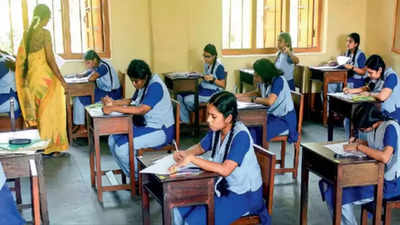Yearender 2024: NCERT textbooks revamped with key curriculum changes

As 2024 concludes, India’s educational reforms take centre stage with significant updates to NCERT textbooks. These revisions, aligned with the National Education Policy (NEP) 2020, aim to modernise the curriculum and reduce the academic burden on students. The changes span multiple subjects, including history, political science, and science, and are set to impact students and educators in the upcoming academic year.
While these updates have been welcomed as progressive by some, others have raised concerns regarding their ideological implications. The modifications also include changes to the availability of new materials and structured programmes to facilitate a smooth transition to the updated curriculum.
New Textbooks for Specific Classes
Introduction of New Syllabus: NCERT introduced new textbooks for Classes 3 and 6 in April and May 2024, marking an essential milestone in curriculum revamps. For Class 3, the updated textbooks emphasise experiential learning with activity-based content in mathematics and environmental studies. The Class 6 revisions include the addition of coding basics in computer science and an enhanced focus on Indian heritage in social sciences. These updates align with NEP-2020, supporting the transition from foundational to middle-stage education.
No Changes for Other Classes: No updates have been made for Classes 1, 2, 4, 5, 9, and 11 for the 2024–25 academic year. Schools will continue to use the textbooks from the previous year for these grades.
Curriculum Rationalisation and Content Updates
Rationalisation Efforts: Initiated in 2021–2022, the rationalisation process aimed to reduce the syllabus load, focusing on supporting students’ mental health post-Covid 19 and creating a more manageable curriculum.
Updates in Science Curriculum: One of the most debated changes in the science curriculum is the removal of the periodic table from the Class 9 syllabus. Critics argue that this shift compromises foundational scientific education, while NCERT asserts that the topic has been moved to Class 11 for better alignment with learning stages.
Revisions in History and Political Science Textbooks
Alterations to Historical Content: The revised history textbooks have undergone substantial changes. References to the Babri Masjid have been replaced with the term “three-domed structure.” Content regarding the BJP’s ‘rath yatra,’ communal violence, and the subsequent political fallout has also been omitted.
Changes in Mughal History: A table summarising the achievements of prominent Mughal emperors such as Akbar, Shah Jahan, and Aurangzeb has been removed. This has sparked criticism regarding the exclusion of significant historical narratives that contribute to a nuanced understanding of India’s past.
New Terminologies and Perspectives: The term “classical history” has replaced “ancient history” in social science textbooks. Additionally, proposals to replace ‘India’ with ‘Bharat’ in textbooks are under consideration, aligning with constitutional terminology.
Political Science Revisions: The revised Class 11 political science textbooks now state that political parties often prioritise “minority appeasement” for “vote bank politics.” This change has been critiqued for introducing potentially contentious political views into academic content.
Implementation Timeline and Availability
Rollout of New Materials: The revised textbooks for Classes 3 and 6 were released in phases, with Classes 3 materials available from April 2024 and Class 6 from May 2024. The updates for other grades are anticipated in subsequent academic years.
Bridge Programmes for Educators: To facilitate the transition to the new curriculum, NCERT has introduced “Bridge Programmes.” These programmes aim to prepare educators in CBSE, Kendriya Vidyalaya Sangathan (KVS), and Navodaya Vidyalaya Samiti (NVS) schools for new pedagogical methods, ensuring smooth implementation.
Support and Criticism
While these changes reflect efforts to modernise education and align it with global standards, they have not been without controversy. The removal of specific content, particularly in history and science, has sparked debates about the objectivity and inclusiveness of the curriculum. Supporters argue that these revisions are necessary for reducing redundancy and fostering a sharper focus on essential topics.
The year 2024 has been transformative for NCERT textbooks, with these updates poised to influence the education system significantly. The forthcoming academic year will serve as a litmus test for the efficacy and reception of these changes in classrooms across the country.





